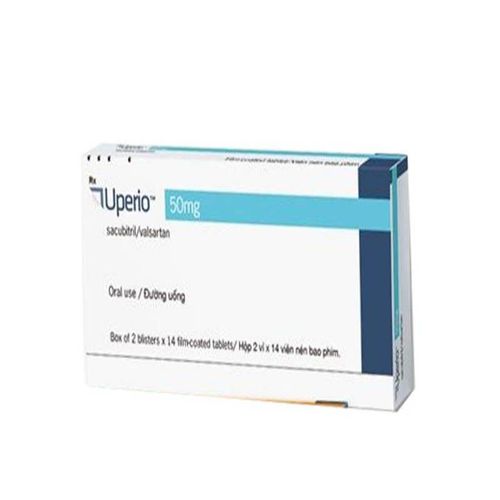1. What is Uperio medication?
Uperio is a cardiovascular drug formulated in various dosages and components, including:
- Uperio 50mg: Each tablet contains 24.3mg of sacubitril and 25.7mg of valsartan.
- Uperio 100mg: Each tablet contains 48.6mg of sacubitril and 51.4mg of valsartan.
- Uperio 200mg: Each tablet contains 97.2mg of sacubitril and 102.8mg of valsartan.
2. Indications and contraindications
2.1 Indications for Uperio medication
Uperio is indicated for the treatment of heart failure with symptom in patients with impaired systolic function. Uperio has been shown to reduce the rate of hospitalization due to heart failure and the mortality rate from cardiovascular diseases compared to enalapril. Additionally, Uperio has also been shown to reduce mortality rates from various causes compared to enalapril.
In addition to these uses, Uperio may be used to treat other conditions not listed above. Therefore, it is recommended to consult with a doctor before using the medication to ensure proper use and effectiveness.
2.2 Contraindications for Uperio
Uperio should not be used in the following cases:
- Hypersensitivity to any of the components of the drug
- Pregnant women
- History of angioedema related to Angiotensin Receptor Inhibitors
- Severe liver failure
- Biliary cirrhosis
- Cholestasis
3. Usage and dosage of Uperio
Uperio is formulated in tablet form, making it suitable for use either on an empty stomach or after meals. Patients are advised to take the medication with a full glass of water to avoid stomach irritation. The dosage of Uperio will depend on the patient's condition and age, as follows:
- The recommended starting dose is 100 mg per day for patients who are not currently using angiotensin-converting enzyme inhibitors (ACE inhibitors) or angiotensin II receptor blockers (ARBs). This dosage may also be considered for patients who have previously used these medications.
- For patients with systolic blood pressure ≥100-110 mmHg who are not using ACE inhibitors or ARBs, or who previously used these medications at low doses, the recommended starting dose is 50 mg twice daily. The dose can be doubled every 2-4 weeks, depending on tolerance, to reach the target dose of 200 mg twice daily.
- If systolic blood pressure is ≤95 mmHg, symptomatic hypotension occurs, clinically significant hyperkalemia develops, or renal dysfunction is present, adjustments to concurrent medications should be made. The dose of Uperio should be temporarily reduced or discontinued.
- For elderly patients: The dosage should be adjusted based on renal function. For those with moderate or severe renal impairment or moderate hepatic impairment, the recommended starting dose is 50 mg twice daily. Uperio is not recommended for patients with end-stage renal disease.
- For children and adolescents under 18 years of age: The safety and efficacy of Uperio have not been established.
Use Uperio regularly to maximize its benefits. For safe use, take Uperio exactly as prescribed by your doctor, do not exceed, reduce, or extend the dosage beyond the prescribed duration. Avoid overusing the medication for an extended period or increasing the dosage on your own. Doing so can not only worsen your condition but also increase the risk of unwanted side effects.
4. Adverse effects of using Uperio
Some adverse effects that may occur when using Uperio include:
- Low blood pressure (hypotension)
- Increased or decreased potassium levels
- Reduced kidney function
- Anemia
- Low blood sugar (hypoglycemia)
- Headache, dizziness, fainting, lightheadedness
- Cough
- Diarrhea
- Nausea
- Stomach inflammation (gastritis)
- Fatigue, weakness
Before prescribing Uperio, doctors carefully consider its benefits and effectiveness, ensuring they outweigh the potential risks of side effects. However, some adverse effects may still occur in certain cases. Therefore, if any unusual symptoms arise after taking the medication, especially signs of a severe allergic reaction such as difficulty breathing, severe dizziness, swelling, rash, or itching around the face, throat, or tongue,... patients should immediately notify healthcare professionals for prompt intervention.
5. Some important considerations when using Uperio
Here are some key points to remember when taking Uperio:
- Inform your doctor about any history of allergies to Uperio or any other substances. Uperio may contain inactive ingredients that could cause allergic reactions or other serious issues.
- Disclose all medications you are currently using, including prescription drugs, over-the-counter medications, herbal supplements, dietary supplements, foods, dyes, or preservatives.
- Do not use Uperio within 36 hours after receiving treatment with ACE inhibitors.
- Evaluating patients with heart failure should always include assessing kidney function. Patients with mild to moderate kidney impairment are at higher risk of developing high blood pressure. There is limited clinical experience with patients suffering from severe kidney dysfunction (estimated glomerular filtration rate (GFR) <30 mL/min/1.73m²), and these patients are at the highest risk of high blood pressure. Uperio is not recommended for patients with end-stage kidney disease due to the lack of evidence for efficacy with its use in these individuals.
- Treatment should not be initiated if serum potassium levels exceed 5.4 mmol/L. The use of Uperio may increase the risk of hyperkalemia, although hypokalemia can also occur. Regular monitoring of serum potassium is recommended, especially in patients with risk factors such as renal impairment, diabetes, hypoaldosteronism, a high-potassium diet, or concurrent use of mineralocorticoid receptor antagonists.For patients with clinically significant hyperkalemia, it is recommended to adjust concurrent medications, temporarily reduce the dosage, or discontinue Uperio. Discontinuation of treatment should be considered if serum potassium levels remain above 5.4 mmol/L.
- In cases of angioedema, Uperio must be stopped immediately, and appropriate medical intervention should be undertaken. Patients should be closely monitored until all symptoms and clinical signs have resolved. Reinitiation of Uperio is contraindicated. For angioedema localized to the face and lips, symptoms often resolve spontaneously without treatment, though antihistamines may be used to manage discomfort.
- Uperio use may affect kidney function, particularly in dehydrated patients or those taking nonsteroidal anti-inflammatory drugs (NSAIDs) concurrently. For patients who experience significant renal dysfunction, dosage reduction should be considered.
- As with other medications that affect the renin-angiotensin-aldosterone system, Uperio may increase blood urea nitrogen and serum creatinine levels in patients with bilateral or unilateral renal artery stenosis. Caution is advised when prescribing Uperio to such patients, and regular monitoring of kidney function is recommended.
If you miss a dose of Uperio, take it as soon as possible. However, if the next dose is near, skip the missed dose and continue with your regular dosing schedule. Do not take a double dose to make up for the missed one.Taking an overdose of Uperio can lead to serious symptoms such as nausea, vomiting, abdominal pain, weakness, and especially low blood pressure, as Uperio has a blood-pressure-lowering effect.
Drug interactions
Drug interactions may reduce the effectiveness of Uperio or increase the risk of adverse effects. Inform your doctor about all other medications you are currently taking, including vitamins, over-the-counter drugs, prescription medications, and herbal products. Do not stop, start, or adjust the dosage of any medication without your doctor’s approval.
Some medications may interact with Uperio, including:
- Angiotensin-converting enzyme (ACE) inhibitors are contraindicated for concurrent use with Uperio because the combined inhibition of neprilysin and ACE inhibitors may increase the risk of angioedema. Uperio should not be initiated within 36 hours after the last dose of an ACE inhibitor, and similarly, ACE inhibitors should not be started within 36 hours after the last dose of Uperio.
- Aliskiren: contraindicated with Uperio in patients with diabetes type 2.
Angiotensin II Receptor Blockers : Due to the angiotensin II receptor-blocking effects of Uperio - Statins: Uperio may increase the systemic concentration of substrates in the OATP1B1 and OATP1B3 transporters, such as statins. Additionally, concurrent use of statins with Uperio can double the maximum plasma concentration (Cmax) of atorvastatin and its metabolites and increase the area under the curve (AUC) by up to 1.3 times.
- PDE5 Inhibitors, including Sildenafil: Concurrent use of a single dose of sildenafil with Uperio in stable hypertensive patients may cause a significant drop in blood pressure. Therefore, caution is advised when starting sildenafil or other PDE5 inhibitors in patients already being treated with Uperio.
- Potassium: Co-administration of potassium-sparing diuretics (such as triamterene, amiloride), mineralocorticoid receptor antagonists (such as spironolactone, eplerenone), potassium supplements, or potassium-containing salts can lead to increased serum potassium levels and elevated serum creatinine levels. Monitoring serum potassium is recommended when Uperio is used in combination with these medications (see the precautions section).
Nonsteroidal Anti-Inflammatory Drugs (NSAIDs), including Selective COX-2 Inhibitors: In elderly patients, those with reduced circulating blood volume (including patients on diuretics), or patients with impaired renal function, concurrent use of Uperio and NSAIDs can increase the risk of worsening renal function. Therefore, it is recommended to monitor renal function when starting or adjusting doses of NSAIDs in patients receiving Uperio concurrently. - Lithium: The drug interaction potential between Uperio and lithium has not been studied. Elevated serum lithium levels and toxicity have been observed when lithium is used concurrently with angiotensin-converting enzyme (ACE) inhibitors or angiotensin II receptor blockers. Therefore, it is recommended to monitor serum lithium levels carefully when used in combination with Uperio. The risk of lithium toxicity may be further increased if used with a diuretic.
- OATP and MRP2 Transporters: The active metabolite of sacubitril (LBQ657) and valsartan are substrates of OATP1B1, OAT3, and valsartan is also a substrate of MRP2. Therefore, concurrent use of Uperio with inhibitors of OATP1B1, OATP1B3, OAT3 (such as rifampin, cyclosporine) or MRP2 (such as ritonavir) may increase the levels of LBQ657 or valsartan in circulation. Caution should be exercised when initiating or discontinuing treatment with these medications.
- Storage of Uperio
Store Uperio at room temperature, away from light and moisture. Do not store Uperio in damp or freezing conditions. Different medications may require different storage methods, so carefully read the storage instructions on the Uperio packaging or ask your pharmacist. Keep Uperio out of reach of children and pets. In summary, Uperio is effective in treating symptomatic heart failure in patients with systolic dysfunction. It has also been shown to reduce hospitalization and mortality rates due to cardiovascular disease. However, Uperio may cause some side effects and drug interactions, so it is important to inform your doctor about any other medications you are using to minimize the risk of side effects and enhance the effectiveness of your treatment.
Please dial HOTLINE for more information or register for an appointment HERE. Download MyVinmec app to make appointments faster and to manage your bookings easily.













